#i'm not totally satisfied with these edits but both these scenes are so dark that this is as good as it's gonna get from me lmao
Text
So I finished bg3 and thought the ending was Fine, Actually
Maybe I expected the worst after seeing so many people voicing their disappointments
Maybe I was lucky to avoid most bugs that made the experience worse for others
Or maybe I'm just too happy with my boy Withers/Jergal being a total badass MVP both in my good dark urge ending (I'll write more about this in another post) and in the after credits scene so that everything else pales in comparison
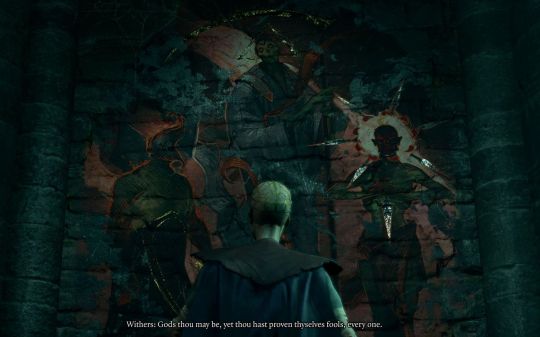
Hell yeah bro you tell them
...but yeah, I quite liked this ending. It hit all the right notes for me: big epic final fight, big stakes, dramatic cinematics, all of all allies gathering to help, final words from our companions before we go and celebrate our victory
Sure, there is room for improvement and the ways it could be made more impactful and reflect our choices better; and with so many people being unhappy with the ending, I wouldn't be surprised if Larian make those improvements in a future enhanced edition or something
But so many people who are unhappy with the ending are asking for detailed epilogue sliders and look
I'm probably going to give a very controversial opinion here
But I don't really care for epilogue sliders. I don't hate them, of course, many great RPGs have ending sliders. They are fine. Especially in the heavily text-based games. But personally, if the game's story worked well on its own, tied all the loose ends and answered the big questions, I'm fine with just having a big satisfying ending scene and riding off into the sunset. We won, there is a bright future ahead of us, who knows what it will bring. Maybe there will be a sequel, maybe you can just imagine things. It's fine to end it at that.
Meanwhile, epilogue sliders bring a certain sense of... finality that I don't always vibe with. It's one thing to see your choices pay off in the game itself, but spelling out the characters' futures for years to come is sometimes a bit too much. Also, in most cases it just boils down to "this village you saved? yup, it's saved, everyone is living happily now" and "this character you helped and who already told you their plans for the future? yeah, they are going to do just that, they are going to be fine". Which is sometimes nice to hear, I get that.
Or, alternatively, when the epilogue gives you an unexpected outcome, and it's not really something you wanted for this character, it kind of sucks, you know? You are not going to replay a game for one different slider. But then you are like, "okay, those are just sliders, I can pretend this didn't happen like that" and then this whole things kinda falls apart. Sliders never quite feel like the "real" part of an ending for me, more like some musings about the most likely future. I can take them or leave them.
But like I said, it's much more important for me to have the game itself end on a strong note. Tbh, endings tend to be the weakest part of SO MANY great RPG games that are amazing otherwise; and Baldur's Gate 3 is far, FAR from the worst examples. With so many hours of gameplay, and so many choices you can make, it's super hard to end it in a way that truly does justice to this entire experience.
...but for some people, like me, it's enough to see Jergal shit talking the Dead Three. That's all I ever wanted from this game. Absolutely iconic.
17 notes
·
View notes
Text
Osblaine Appreciation Week Day 5- Clothes. Osblaine + the brown sex shirt
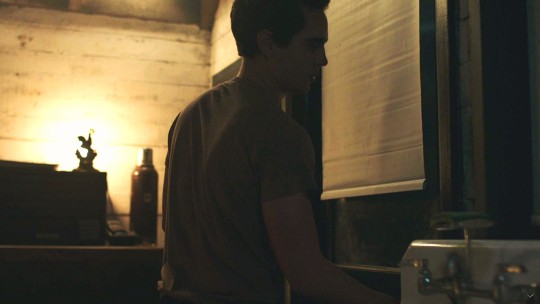

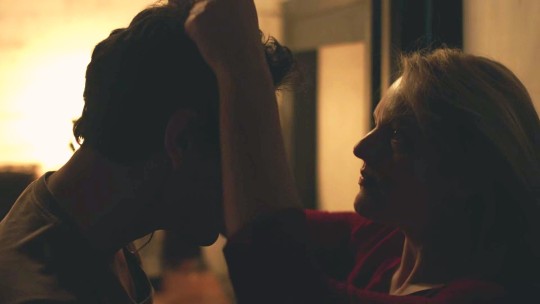
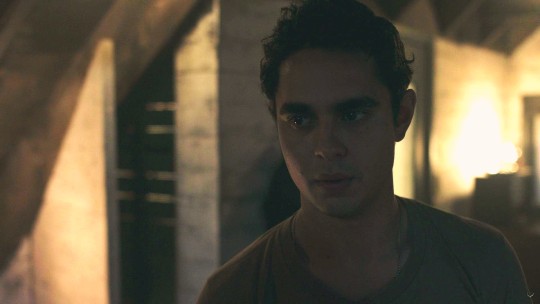
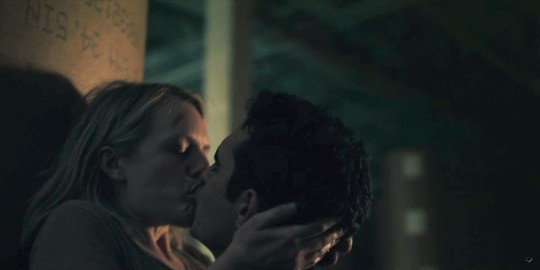
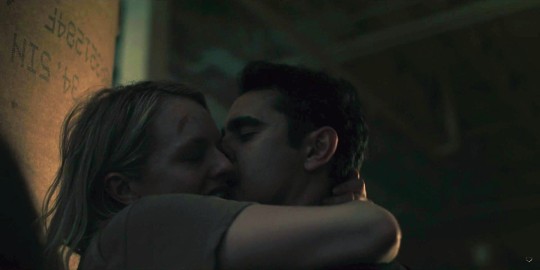
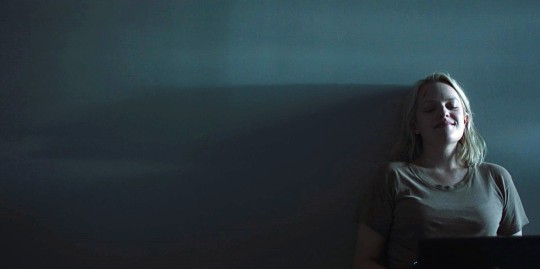
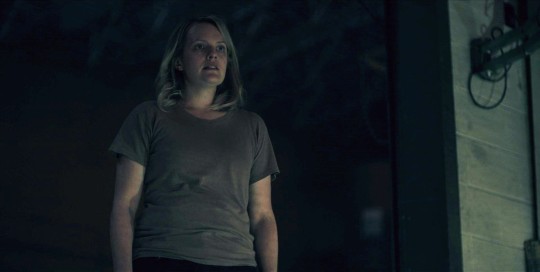
Bonus:


#OsblaineWeek2021#nick x june#the handmaid's tale#nick blaine#june osborne#osblaine#also i including the scene of june watching Friends with a satisfied smile because that episode is about orgasms and nick gifted her many#so really- i'm knocking two entries out of the park here#really- i kinda got all three in one go#lmao i'm impressed i managed that#i'm not totally satisfied with these edits but both these scenes are so dark that this is as good as it's gonna get from me lmao#petition for this show to actually use some light because have you ever tried to edit something for it? painful#it's like their only source of light is a single glowstick#pls upgrade to a lamp i beg
127 notes
·
View notes
Note
Hi! I'm new(ish) to the 100 fandom, and I was wondering if you know of metas on Bellamy and his journey of where he began and how far he's come? Thanks!
You know, I’m sure there are other metas out there, but I saw this and was like…man, that would be fun to write. So you did not ask for this, but here, let’s have a Bellamy Blake Retrospective. (Also hi, and welcome to the fandom! If you’re interested you can search my blog for bellarke meta, bellamy meta, and the 100 meta because I write a lot about Bellamy and I’m bad at tagging consistently but those are the tags I most likely used. And if anyone knows of other overarching Bellamy metas about his character so far, let me know!)
In a lot of respects, Bellamy Blake in 101 is nothing like he is as of 403. For one thing, his hair is a lot better now, and for another thing they seem to have settled on some consistent character beats instead of “idk, reckless bad guy?” Overall, I’d say there’s two facets of his personality that the show is interested in exploring, one internal and one external, and they touch on each theme in each season although they tend to switch back and forth between which one gets the main spotlight. Internally, it’s guilt: how does he cope with the things he’s done? How does he reconcile his sins with who he wants to be? Externally, it’s protecting those he loves: how far is too far? Does that limit exist?
There’s also a character trait that has existed since the pilot but that went dormant for a bit before resurfacing in season four: unflinching acceptance of the end. The line of his from the pilot that I am finding myself remembering a lot now that s4 is airing is if the air is toxic, we’re all dead anyway. Clarke wants to come up with a plan, but Bellamy surveys the options– open the door and die quickly, stay inside and die slowly– and chooses immediate death. It’s a dark moment, but it tells us a lot about him right off the bat.
If I go episode by episode we will be here all damn day, so I’m going to talk about him in terms of season-long arcs. Season One Bellamy was about his external “protective” quality and learning to expand his mission from “protect Octavia” to “protect the delinquents” with a couple of side quests into “forgiveness, is it for you?” and “wow Clarke’s hair is really pretty.”
The moment I want to bring your attention to is when Bellamy offered himself in place of Jasper, because not only was that our official confirmation that Bellamy has decided he’ll die for any of those kids (not just Octavia), but because it highlights something @metastation made me think about recently, which is that Bellamy sees his own life as a tool. He will do whatever it takes to keep them alive, and if that means dying, he’ll fucking do it. He was willing to die for Jasper in season one, just like he was willing to go on a suicide mission for the remaining delinquents in season two. He was originally ready to die for Octavia by getting on the dropship (remember: no one but Abby believed the ground was actually survivable) and by the end of the season, he’s ready to die for Jasper-- someone he suggested mercy killing at the start of it.
We also examine Bellamy’s guilt, mostly in relation to the culling, although that is not the prominent focus of the season. We learn that Bellamy sees himself as someone who hurts people and doesn’t deserve peace, and we see that the rebel in the first few episodes was really a facade. We find out that he feels each death deeply, and that he regrets the monster he thinks he has to be in order to protect people. (Notably, however, he regrets being that monster but he doesn’t reject being that monster outright, a character beat that they bring back in season three).
Season two is mostly an internal/guilt season for Bellamy, although you could argue that he tried to include the Mount Weather Resistance under his protection but ultimately he failed. It is treated as a given in season two that he will protect his people, and having to choose to sacrifice the Mount Weather Resistance is framed as sad but understandable (and directly linked to Octavia). But what Bellamy’s season two arc is really about is him trying to atone for the sins he committed during season one (the culling) by saving as many damn people as possible. He’s again willing to use his life as a bargaining chip, but it’s more than just the Mount Weather suicide mission– it’s going after Finn when he’s tied up by Tristan, it’s going against Kane to try and find the rest of the delinquents, it’s going down the mountain to save Mel, it’s trying to save Finn from the grounders, and it’s the Mount Weather suicide mission. Season two takes a thread that was established in season one– Bellamy will die for his people– and tries to tease it out as far as it will go, but it’s not really about broadening the definition of “people.” It’s about exploring the extent to which he is willing to risk his life in order to atone for what he’s done.
And then, season three shows up. And look, I suspect once this series is complete season three is basically gonna be my gasleak season where I pretend it doesn’t exist, because the show attempted to do some things with Bellamy’s character but for various reasons (mostly: editing choices and what I suspect was a hastily redone storyline to account for various behind-the-scenes things) none of it landed. However, we can say that while season two was a deep exploration of Bellamy’s guilt and the extent to which he’ll take it, season three was an exploration of his protective nature and the extent to which he would take that. And apparently: he’ll take that as far as it fucking goes.
Season three was also about the limits to his protective nature and his inability to broaden his definition of “my people” to include the grounders as a whole. At the end of season three we see this shifting, but it’s mostly left for season four to do the heavy lifting on that front. Season three also saw Bellamy resuming the mantle of monster that he tried so hard to shed in season one. He never wanted to hurt anyone-- not Jaha, not the people in the culling, not even Lincoln-- but he did because he thought he had to. The massacre in season three was, I suspect, a continuation of that; Bellamy kills people because he thinks it’s necessary, not because he enjoys it. It ties back to who we are and who we need to survive are two very different things, because who he is is actually someone who loves his people deeply and regrets every violent thing he’s ever done, but who he needs to be is a monster who will kill the army at their doorstep to keep his people safe. Not all of this really came through in the text, but I’m confident that this was roughly what they were going for with Bellamy’s character.
So now we’re into season four, and I think we’re going to be doing a reprise of his season two character beats where the internal focus takes precedence. We’ve had Kane straight out tell Bellamy how to handle his guilt, and when Jaha asked how many do you have to save to satisfy your guilt you could practically see Bellamy thinking “literally all of them.” We’re on another atonement journey, I suspect, and I don’t think we’ve seen the last of his regret.
We also had him sacrificing the lives of possibly 400 of his own people in order to save 25 slaves, most of whom were grounders. I suspect they’re expanding his definition of “my people” to “literally everyone left on the planet,” but we’re also only three episodes in so it’s hard to judge an entire season’s arc based on that. Still, I’m guessing that while this thread will be important it will be secondary to his guilt and quest for redemption. (You could probably also argue that season four is going to be about both those elements of his personality, but again, we’re only three episodes in so it’s tough to say at this point.)
However, I want to bring this back around full circle and remind you guys of his line in the pilot: if the air is toxic, we’re all dead anyway. While he’s changed in so many ways (and got rid of that hair gel, thank god), Bellamy is still the man he was in the pilot– if death is coming, he sees no point in messing around and trying to delay it by a few hours. And you guys, Bellamy doesn’t think they can survive this. That’s why he was willing to blow up the hydrogenerator; none of those people are going to survive anyway, so he might as well get a few home to their families while he still can. Death is coming; why fight it?
But you know what’s different? In the pilot, Clarke wanted to come up with a plan because any plan, no matter how ridiculous, is better than just opening the doors and dying because that’s how she handles uncertainty– with charts and graphs and maps and strategy. Bellamy overrules her in that episode and opens the door because fuck it, what’s the difference between dying now and dying of dehydration in three days? But now, he’s going along with her plan. He’s taking a trip to Farm Station to get a hydrogenerator he secretly believes they won’t ever need to use and he’s agreeing to let Clarke put him on a list of people she wants to save. He still thinks death is inevitable, but he’s no longer the callous guard from the pilot, opening the dropship door against her advice. He knows that in order to keep going, Clarke needs a plan. He knows that if she stops and just accepts that the end is coming she’ll crumple, and he doesn’t want that for her. (I’d say this applies to all his people in general because he doesn’t want to see anyone hurt, but it is particularly painful for him to see Clarke in any sort of distress so she’s the main focus for his “yeah, we’re definitely gonna live yep yep yep this is totally survivable” charade.)
So when you shove everything else his character has gone through aside– the grounder attack in season one, pulling the lever at Mount Weather in season two, losing Gina and being estranged from his sister in season three– this is what his character boils down to, and this is how he’s changed. When he arrived on the ground he was ready to die and he didn’t really care about anyone who wasn’t Octavia. He was kind of a dick to the woman who wanted a plan to save everyone because he saw no point in a charade and also those other lives weren’t his problem. He’s still ready to die, but now his love stretches to encompass hundreds of people. And when it comes the woman who wants a plan to save everyone, no matter how desperate it is, he’s willing to go to whatever length it takes to keep her going– even if in the end, he still believes they’re all going to die.
#thebonnielassofyvie#the 100 meta#bellamy meta#bellarke meta#just a lil' at the end#also this is kind of a mess#I rewrote it like five times trying to figure out what I wanted to say#and I still don't love it but w/e
48 notes
·
View notes